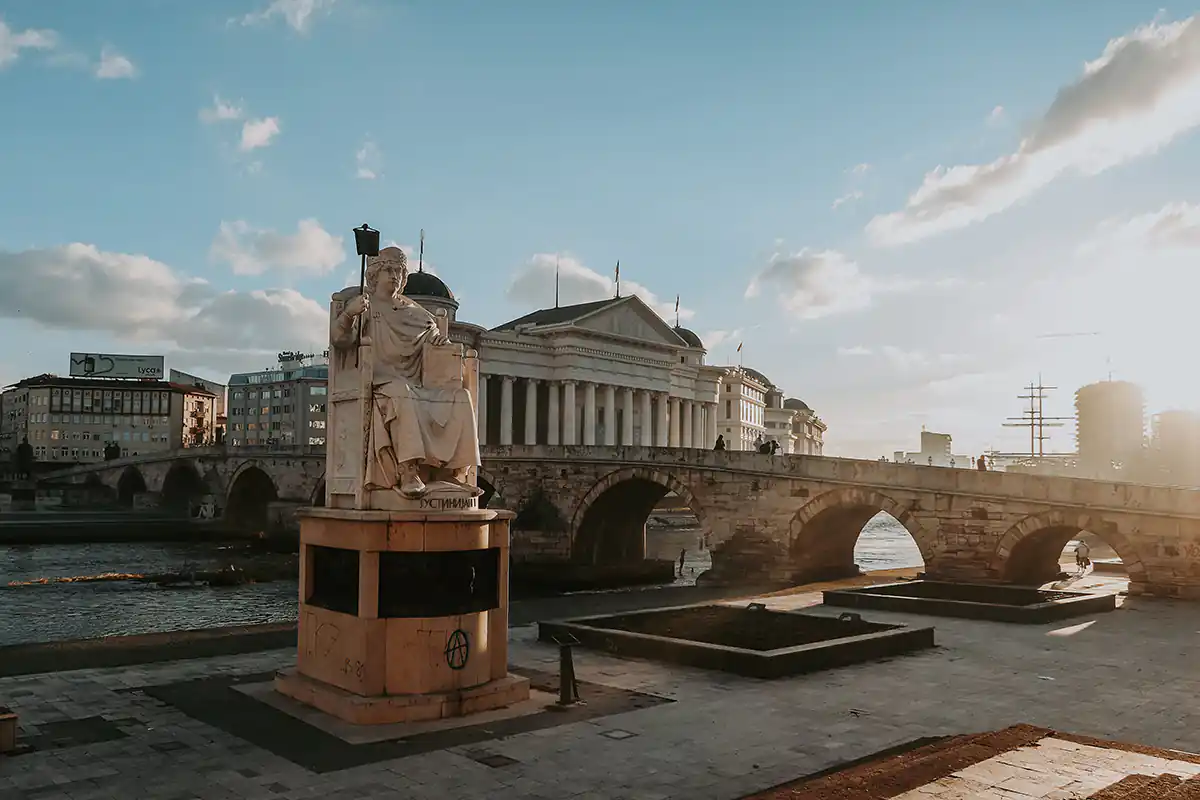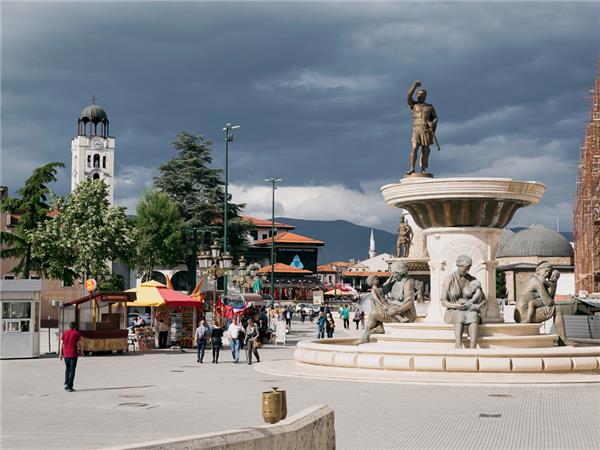Exploring Skopje: Skopje, the vibrant capital city of North Macedonia, stands out not just as the largest urban area in the country but also as a pivotal political, economic, and cultural hub. The city is situated in a strategically significant area in the Skopje valley along the Vardar River. Throughout history, Skopje has been a melting pot, hosting a unique blend of cultural influences from the Byzantine, Ottoman, and Slavic periods, which are evident today in its architecture and cultural offerings. For Albanian travelers, Skopje presents an even greater appeal. The city boasts a substantial Albanian population, creating a familiar social landscape.
Albanian visitors will find numerous opportunities for business and cultural exchange, given the deep-seated historical ties between the two neighboring nations. The city’s mélange of cultures crafts an intriguing atmosphere for those looking to explore the cross-cultural dynamics present in the region. Whether you’re drawn by business prospects or cultural exploration, Skopje’s diverse offerings and its place on the map as a Balkan crossroads are sure to enrich your understanding of the broader regional dynamics.
Geographic Context and Proximity to Albania
Location and Access to Skopje: Positioned in the northern reaches of North Macedonia, Skopje is roughly X kilometers from the border with Albania. Travelers will typically find the nearest border crossing at Debar. This proximity makes Skopje an accessible and attractive destination for Albanian visitors, offering a chance to dive into its rich tapestry of cultural and historical experiences.
Transportation Options:
–
By Road: The E852/A3 highway connects Skopje to major cities in Albania. This route allows for straightforward travel by car, with an approximate journey time that travelers can calculate based on real-time conditions closer to their departure.–
By Air: Flights connecting Skopje International Airport (SKP) with Tirana International Airport Nënë Tereza (TIA) are readily available. Airlines like Wizz Air offer multiple flight options to suit varied schedules. These air links provide a convenient alternative to road travel, especially for those pressed for time.
Why Albanians Love Skopje: As a regional hub, Skopje attracts Albanians pursuing opportunities in business, education, and healthcare. Its significance as a cultural exchange point cannot be overstated, providing a dynamic space where traditional Slavic, Ottoman, and Albanian influences meet. The city hosts various centers dedicated to cultural endeavors and houses communities that echo the linguistic and cultural characteristics familiar to Albanian visitors. The presence of a large Albanian demographic further cements Skopje’s status as a welcoming and connective space for travelers from Albania.
A Journey Through Skopje’s Past
Skopje’s timeline traces back to the ancient Paeonian culture, evolving through significant milestones under different empires. Initially a Roman settlement known as
Scupi, Skopje later flourished under Byzantine rule. The city served as a prominent hub during both the Bulgarian and the Ottoman Empires, transitioning to Serbian control post-Balkan Wars. After the dissolution of Yugoslavia, Skopje took on its role as the capital of independent North Macedonia in 1991. Each phase marks a layer in the city’s rich historical tapestry.
Albanian Influence and Presence: Albanians have longstanding roots in Skopje, contributing to the city’s layered cultural framework. Key cultural touchstones such as schools, mosques, and vibrant community centers underscore this influence. The historic Old Bazaar remains a testament to centuries of Albanian heritage, offering a vivid glimpse into traditional practices that endure today. The integration of Albanian motifs with broader Macedonian cultural patterns reveals a fascinating narrative of coexistence and mutual influence, resonating particularly with visiting Albanians.
Prominent Landmarks in Skopje
Visitors will find numerous attractions weaving Skopje’s eclectic history into its urban fabric:
- Stone Bridge (Kamen Most): Connecting Skopje’s old quarter to its modern cityscape, the Stone Bridge stands as an unmissable landmark. Beyond its utilitarian purpose, this bridge represents a physical and symbolic link between the city’s historical narratives and its aspirations of modernity. Spanning the Vardar River, it invites travelers to walk through time, with each step unveiling different vistas of Skopje’s dynamic architecture and urban rhythm.
- Skopje Fortress (Kale): Dominating the city’s skyline, Skopje Fortress—or Kale—holds stories of conquest and defense dating back to Byzantine times. The fortress offers panoramic views of the region, inviting visitors to explore its ancient walls while contemplating the strategic importance it held across centuries.
- Museums: Skopje is home to several notable museums. The Archaeological Museum offers a rich collection of artifacts that highlight Macedonia’s historical roots. Meanwhile, the Museum of the Macedonian Struggle provides insights into the nation’s path to independence, and the Museum of Contemporary Art showcases an array of modern works that speak to the region’s evolving artistic dialogue.
- Cultural Events and Experiences: The Skopje Jazz Festival stands out as a highlight, attracting international artists and jazz aficionados alike. For those exploring the history of opera and theatrics, the MAY Opera Evenings offer a feast of performances. Local celebrations, especially within the Albanian community, showcase Skopje’s vibrant cultural diversity.
- Culinary Delights: Signature dishes include ćevapi (grilled minced meat), tavče gravče (baked beans), and the ubiquitous burek. Exploring these in the Old Bazaar remains a sensory journey that illustrates the region’s culinary fusion.
Visa-Free Travel and Border Procedures: Albanian citizens currently enjoy visa-free access to North Macedonia for up to 90 days within a 180-day period. This ease of travel underscores the strong bilateral ties. Always carry a valid passport and check official government sources before departure for any updates or restrictions related to COVID-19 or other travel advisories.
Navigating Currency and Language:
–
Currency: The Macedonian Denar (MKD) is official, but Euros are widely accepted in tourist spots, offering convenience for travelers.–
Language: Macedonian is the official language, yet Albanian is also widely spoken, especially within communities. English is common in tourist areas, but learning basic phrases in Macedonian or Albanian can enhance interactions.
Accommodations: Skopje provides a range of lodging options, from budget hostels and guesthouses to upscale hotels. Areas near the Old Bazaar are particularly popular for their proximity to cultural sites and vibrant atmosphere.
Economic and Social Ties Between Skopje and Albania
Bilateral Trade and Cultural Exchange: The trade relationship between North Macedonia and Albania continues to grow, with Skopje serving as a key hub. Cultural exchanges happen through student programs and collaborative arts initiatives, strengthening mutual understanding and cooperation.
Skopje’s Role for Albanians: Many Albanians see Skopje as a gateway for employment, education, and healthcare opportunities. The city acts as a regional hub, offering services and creating networks that benefit the Albanian community.
Demographics and Impact: The Albanian community in Skopje is vibrant, influencing local culture, markets, and social life. This demographic presence fosters a rich multicultural environment, enhancing the city’s diverse identity.
Conclusion
Skopje’s charm lies in its close proximity, historical depth, and shared cultural heritage, making it an appealing destination for Albanian travelers. Its vibrant streets, historic sites, and multicultural atmosphere provide a unique Balkan experience that fosters understanding and discovery.
Expanding horizons: Every visit to Skopje offers an opportunity to learn about the layers of Balkan history, listen to diverse cultural expressions, and connect with both local and Albanian communities. The city’s rich heritage creates a compelling invitation for explorers.
Your invitation to discover: With countless attractions and experiences awaiting, Skopje beckons travelers to immerse themselves in its vibrant life. Whether exploring alone or with company, the city promises memorable insights into the fascinating crossroad of cultures in the Balkans. Plan your journey now, and let Skopje leave its mark on you.





